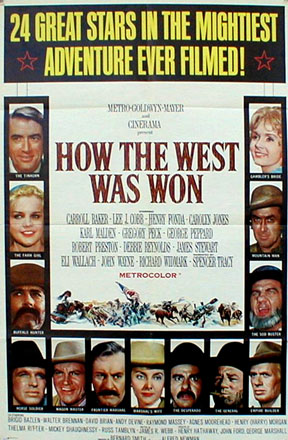How the West Was Won
Produced by Cinerama for $14 million, and released by MGM in 1962 for 3-screen exhibition, earned only $12 million, the last of the 7 Cinerama films developed since 1952 by Fred Waller and recording engineer Hazard Reeves, using three 35mm Technicolor prints projected on a 146-degree curved screen, a 4th 35mm filmstrip was used for the 7 magnetic soundtracks, the filmstrips ran at a speed of 26 fps rather than 24, with 6 perforations rather than 4. The original length including musical interludes was 167 mins.; Laserdisc at 2.35:1 released 1991, DVD at 2.35:1 with new Telecine transfer released 1998.
Production:
- Directed by John Ford (segment "Civil War, The"), Henry Hathaway (segments "Rivers, The", "Plains, The", "Outlaws, The"), George Marshall (segment "Railroad, The"), Richard Thorpe (transitional historical sequences)
- Written by John Gay, James R. Webb
- Produced by Bernard Smith
- Original music by Ken Darby, Alfred Newman
- Cinematography by William H. Daniels,m Milton R. Krasner, Joseph LaShelle (segment "Civil War, The") Charles Lang
- Film Editing by Harold F. Kress
- Sound Editing by Franklin Milton
- Narrated by Spencer Tracy
Cast:
- James Stewart as Linus Rawlings
- Karl Malden as Zebulon Prescott
- Agnes Moorehead as Rebecca Prescott
- Debbie Reynolds as Lillith Prescott
- Carroll Baker as Eve Prescott
- Tudor Owen as Parson Harvey
- George Peppard as Zeb Rawlings, Eve's son
- Henry Fonda as Jethro Stuart
- Richard Widmark as Mike King
- Lee J. Cobb as Marshal Lou Ramsey
- Eli Wallach as Charlie Gant
- Gregory Peck as Cleve Van Valen
- Carolyn Jones as Julie Rawlings
- Robert Preston as Roger Morgan
- John Wayne as Gen. William T. Sherman
- Harry Morgan as General Ulysses S. Grant
- Raymond Massey as Abraham Lincoln
- Barry Harvey as Angus
- Brigid Bazlen as Dora Hawkins
- Walter Brennan as Colonel Hawkins
- Andy Devine as Corporal Peterson
- Thelma Ritter as Agatha Clegg
- Kim Charney as Sam Prescott
- Claude Johnson as Jeremiah Rawlings
- Bryan Russell as Zeke Prescott
- Lee Van Cleef as Marty
- Ben Black Elk Sr. as Indian Chief
Themes:
This 1962 film is a visual interpretation of several well-established themes in American history. Frederick Jackson Turner argued in his seminal 1893 essay that the frontier became a safety valve that caused American democracy and produced a unique national character. George Rogers Taylor argued in 1951 that canals and railroads caused a revolution in American society and economy. Daniel Boorstin argued in his trilogy The Americans that the nation was shaped by upstarts and immigrants who created new communities with a practical ideology and innovative technology. The American family underwent profound changes in the antebellum era as the industrial revolution caused a breakdown of patriarchy, and children set out on their own to create new jobs in cities. The public world of commerce and industry supplanted the private world of family and farm. The birth rate declined and the status of women changed in a nation increasingly secular, rational, progressive. Above all, it is the theme of progress across four generations that gives this film its motive and structure.
Links:
Revised 11/7/03 | Filmnotes | Songs |Transportation Revolution

